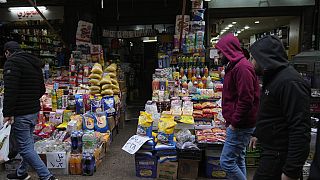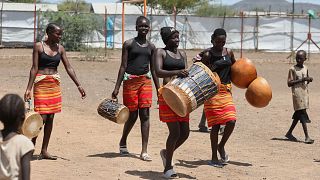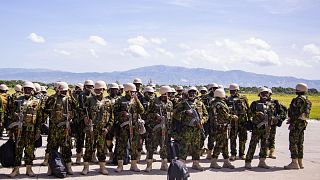Kenya
The killing of 10 lions in just one week in May at Kenya's Amboseli National Park has highlighted an increasing conflict between humans and wildlife over resources and climate change.
One of slain lions was 19 year-old Loonkiito; one of Kenya's oldest lions.
In some areas, lion populations overlap with human settlements and livestock grazing areas leading to negative interaction and conflicts that often result in economic losses, threats to human life and conservation challenges.
Daniel Ole Sambu heads the predator protection programme, Big Life Foundation and explains how the lions' territory is under threat.
"These wild animal needs space, including predators," he says. "So, we are losing habitats, very important habitats for predators because of land subdivision and people resorting to the selling of land and then human population also becoming a challenge because we have homesteads coming up in every other area.
"Urbanisation, we have roads and power lines coming up in every other space, so it's a challenge to have so many predators in one area, so many other herbivores in one area."
Recent rains that came after a prolonged period of drought attracted a large number of herbivores that feed on grass growing close to human settlements.
This also attracts carnivores that are pursuing prey, such as zebra, thus increasing the chances of human-wildlife interactions that could end in fatalities.
During drought, lions wander into pens that house livestock and kill cattle.
The World Society for the Protection of Animals has said the loss of habitat and climate change has threatened the number of lions in the wild and that their future now looks "bleak" but some locals say the lions are too dangerous.
Parkeru Ntereka is a local herder and says: "Since the olden days, we believed that when a lion invades your home and eats your cows, it will still return even after ten years. It will never forget that your home was once a source of food."
Government and conservation groups - including the Big Life Foundation - have compensation programs for herders whose livestock is killed by wild animals.
But herders have become more protective after losing livestock to a drought that has been termed the "worst in decades" in the East Africa region.
Joel Kirimbu is also a herder and suggests the compensation scheme is inadequate
"There is a significant disparity between the value of our livestock and the amount of money that we receive for compensation," he explains.
"Cows are expensive, and can cost as much as Ksh 80,000. One cannot compare Ksh 80,000 to Ksh 30,000. We receive very little compensation. That is why we become angry and despite receiving compensation, we come out and kill the lions."
This and a prolonged period that victims must wait until they receive compensation have come under sharp criticism from the community.
The programme does also not compensate for losses related to human life as well as crops.













00:28
Nairobi hawker shot at close range by police declared brain dead
00:48
Death toll in Kenyan anti-government protests rises to 16, says rights group
01:00
Animal shelters in the US use live music to soothe anxious pets
01:07
Kenya prepares for first anniversary of Finance Bill protests
01:52
UN's crucial humanitarian aid work faces a clouded future amid cuts in funds
02:00
Refugees in Kenyan camp face hunger after USAID funding freeze